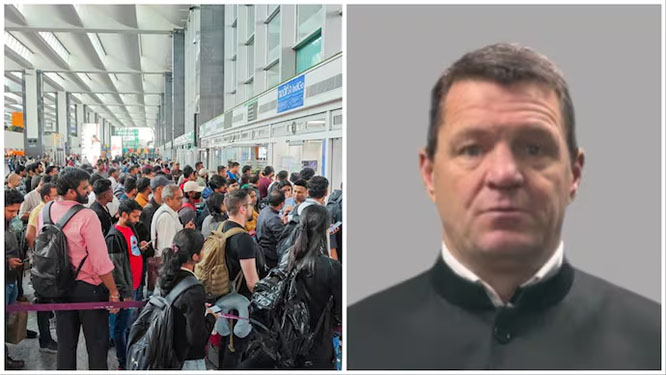New Delhi, June 11: A group of public health experts, including doctors from AIIMS and members from the national taskforce on Covid-19, have said that mass, indiscriminate and incomplete vaccination can trigger emergence of mutant strains and recommended that there is no need to inoculate those who had documented coronavirus infection.
In their latest report, the experts from Indian Public Health Association (IPHA), Indian Association of Preventive and Social Medicine (IAPSM) and Indian Association of Epidemiologists (IAE) said vaccinating the vulnerable and those at risk, instead of mass population-wide inoculation including children, should be the aim at present.
"The present situation of the pandemic in the country demands that we should be guided by the logistics and epidemiological data to prioritise vaccination rather than opening vaccination for all age groups at this stage.
"Opening all fronts simultaneously will drain human and other resources and would be spreading it too thin to make an impact at the population level," the experts said in the report which has been submitted to Prime Minister Narendra Modi.
Highlighting that vaccination of young adults and children is not supported by evidence and would not be cost effective, they said unplanned inoculation can promote mutant strains.
"Mass, indiscriminate, and incomplete vaccination can also trigger emergence of mutant strains. Given the rapid transmission of infection in various parts of the country, it is unlikely that mass vaccination of all adults will catch up with the pace of natural infection among our young population," they said in the report.
There is no need to vaccinate people who had documented Covid-19 infection. These people may be vaccinated after generating evidence that vaccine is beneficial after natural infection, the recommendations stated.
Evidence-based flexibility in vaccine schedules may need to be considered for areas or populations experiencing surge on account for specific variants; for example, a reduced interval for the second dose of Covishiled for areas with surge due to the delta variant.
"Vaccine is a strong and powerful weapon against the novel coronavirus. And like all strong weapons it should neither be withheld nor used indiscriminately; but should be employed strategically to derive maximum benefit in a cost-effective way," they said.
While it makes perfect sense to vaccinate all adults, the reality is that the country is in the midst of an ongoing pandemic with limited availability of vaccines, the report said.
In this scenario the focus should be to reduce deaths, majority of which are among older age groups and those with co-morbidities or obesity. Vaccinating young adults, given the present constraints, will not be cost-effective, they stated.
The report suggested implementing repeated local level serosurveys in real time at the end of the second wave to map the vulnerability at district level to guide vaccination strategy and long term follow up of the cohort of recovered Covid-19 patients to document re-infection, severity and outcome to provide evidence base on duration of immunity after natural infection.
Ongoing research on vaccine effectiveness under field conditions by following cohorts of vaccinated and unvaccinated in different age strata should be prioritised.
Stating the current wave is largely attributable to multiple variants, the experts pointed out that India has done genome sequencing of less than 1 per cent of its positive samples and also lags behind other high incidence countries in another crucial measure, sequence per 1,000 cases.
Achieving a target of genomic sequencing of 5 per cent positive samples looks challenging at the moment, but all efforts should be made to reach at least 3 per cent mark, they recommended while appreciating setting up of the Indian SARS-CoV-2 Genomics Consortium (INSACOG) of 10 national laboratories timely and addition of 17 more laboratories.
The molecular epidemiology investigations need to be accelerated with INSACOG scientists, field epidemiologists and clinical specialists working in synergy to delineate the epidemiological features of the variants with specific reference to transmissibility and fatality.
Genetic sequences need to be tracked to delineate virus transmission both across the community and in health care settings. It can detect outbreaks that may otherwise be missed by traditional methods, the experts pointed out.
They also recommended that syndromic management approach should be rolled out in a planned manner after sensitisation of healthcare staff, along with the optimum utilisation of laboratory testing.
There is an acute shortage of testing facilities for SARS-CoV-2 in rural and peri-urban areas.
The sensitivity of RAT is quite low; there are chances that some truly positive cases would remain unidentified and thus continue to spread the disease.
"Timely testing of each and every symptomatic patient is not possible and will put a huge burden on the health system and will delay the isolation and treatment. The optimal solution in such a situation is to adopt a syndromic management approach. It should put focus on making diagnosis based on clinical symptoms and epidemiologically linked suspects," they said.
They further recommended that the vaccination status of all individuals tested for Covid-19 must be entered into the sample referral form in the RTPCR app both for individuals tested by RTPCR and RAT.
The collected information must be analysed periodically to know the status of vaccinated individuals with regards to Covid-19 and its severity including mortality.
As way forward, the experts said that district level sero surveillance may be planned with the methodology of EPI cluster sampling.
" If the seroprevalence at district level, is more than 70 per cent (on account of a combination of natural infection and vaccination,) there should not be any lockdown and return to normalcy should be attempted.
"This will also help in prioritizing the districts for vaccination i.e. districts with lower seroprevalence should be given priority for vaccination. A fine balance is needed to be maintained between life and livelihood."
The experts also said that if very large number of individuals are vaccinated at a fast pace with limited resources for monitoring of adverse events following immunization (AEFI), some adverse events and deaths will be missed. Also, while some of these AEFI may be coincidental, it may end up contributing to vaccine hesitancy.







Comments
Add new comment